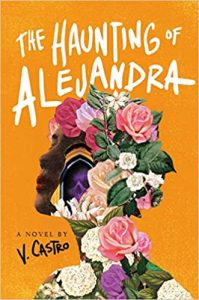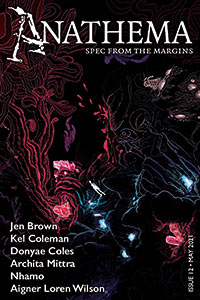Gabino Iglesias Reviews The Haunting of Alejandra by V. Castro
 The Haunting of Alejandra, V. Castro (Del Rey 978-0-59349-969-6, $28.00, 272pp, hc) April 2023
The Haunting of Alejandra, V. Castro (Del Rey 978-0-59349-969-6, $28.00, 272pp, hc) April 2023
The Haunting of Alejandra by V. Castro is a horror novel that’s not afraid to explore touchy subjects. At once a creepy story of ghosts, curses, and apparitions and a complex narrative that explores identity, grief, loneliness, depression, suicidal thoughts, and the difficulties of a crumbling marriage, The Haunting of Alejandra mixes together a wide array of important topics with a touch of folklore as it chronicles the lives of generations of women from the same family who have been forced to deal with a special kind of darkness.
Alejandra feels lost, frustrated, and depressed. She doesn’t like her three kids as much as she thinks she should, finds no pleasure in the endless chores that occupy her day, no longer knows who she is, and feels trapped in a marriage that only offers her financial stability. However, she is aware that the hole she finds herself in is one she dug herself by always focusing on trying to achieve the things others told her she should aspire to: being a good wife and mother. While Alejandra’s relentless depression and her wishes to escape are not unique, and similar feelings affect many people in her position, her malaise is worse because, in her lowest moments, some of her darkest thoughts come accompanied by ghostly visions, including one of a crying woman in a ragged white gown. When things get too bad and Alejandra accepts she needs help, she starts seeing a therapist who is also a curandera – a traditional healer – and through their conversations she starts exploring her family’s history, the impact her strict Christian adoptive family had on her after her biological mother gave her up for adoption, and her devastating sense of sadness and dissatisfaction. While the therapy helps, Alejandra is also dealing with something much darker, a family curse, and that, unfortunately, is not something she can take care of with the exercises and tools she receives from her therapist. In order to save herself and her kids, Alejandra will have to fight a war with a being that’s not human and which has been preying on the pain and grief of her bloodline for years.
The Haunting of Alejandra starts in a way that makes readers think it might be a classic story of demonic possession, but that quickly changes. Alejandra tried to get in touch with her roots, but never too deeply. The thing that haunts her blood is La Llorona, the vengeful and murderous mother of Mexican legend who drowned her own children for the love of a man and now wants to inflict the same pain she felt on other mothers and their children. However, the ‘‘creature’’ is also more than La Llorona; Castro has created an ancestral being from somewhere beyond the earth that has fed on the sorrow of not only Alejandra but also her mother and grandmother before her. For Alejandra, the demon in the story is, in more than one way, generational trauma, and healing it requires a lot of work and to break with things that inhabit her DNA.
Alejandra is a strong character, complex and multilayered. She has a unique voice and family history. However, she is also every woman in the sense that she suffers under the weight of all the things society expects of her and the plethora of things society tells her she must achieve in order to be complete, regardless of whether those things align with her dreams and desires or not. Castro explores not only the roles women have been historically pushed into, she also adds a very complicated layer by making Alejandra a Brown woman and showing her family roots in Mexico, which means she looks at the lingering harmful effects brought on by the invasion and conquest of Mexico.
Horror novels are fertile ground to explore important issues, and that’s exactly what Castro does here. The Haunting of Alejandra is a dark story of grief, pain, generational trauma, and the harsh battles to exorcise the demons of depression, suffering, insecurity, and history. However, it’s also a narrative that celebrates traditional healing and recognizes the importance of therapy when it comes to dealing with mental health issues. Last, this is a novel that celebrates the strength and courage of all women and that, for those who need it, will read like an invitation to fight for the changes that will make things better for them.
V. Castro has been a great horror writer in the indie horror scene for years, and this novel marks her arrival at the big leagues and hopefully will turn many new readers on to her work.
Gabino Iglesias is a writer, journalist, professor, and book reviewer living in Austin TX. He is the author of Zero Saints and Coyote Songs and the editor of Both Sides. His work has been nominated to the Bram Stoker and Locus Awards and won the Wonderland Book Award for Best Novel in 2019. His short stories have appeared in a plethora of anthologies and his non-fiction has appeared in the New York Times, the Los Angeles Times, and CrimeReads. His work has been published in five languages, optioned for film, and praised by authors as diverse as Roxane Gay, David Joy, Jerry Stahl, and Meg Gardiner. His reviews appear regularly in places like NPR, Publishers Weekly, the San Francisco Chronicle, Criminal Element, Mystery Tribune, Vol. 1 Brooklyn, the Los Angeles Review of Books, and other print and online venues. He’s been a juror for the Shirley Jackson Awards twice and has judged the PANK Big Book Contest, the Splatterpunk Awards, and the Newfound Prose Prize. He teaches creative writing at Southern New Hampshire University’s online MFA program. You can find him on Twitter at @Gabino_Iglesias.
This review and more like it in the May 2023 issue of Locus.
 While you are here, please take a moment to support Locus with a one-time or recurring donation. We rely on reader donations to keep the magazine and site going, and would like to keep the site paywall free, but WE NEED YOUR FINANCIAL SUPPORT to continue quality coverage of the science fiction and fantasy field.
While you are here, please take a moment to support Locus with a one-time or recurring donation. We rely on reader donations to keep the magazine and site going, and would like to keep the site paywall free, but WE NEED YOUR FINANCIAL SUPPORT to continue quality coverage of the science fiction and fantasy field.
©Locus Magazine. Copyrighted material may not be republished without permission of LSFF.






